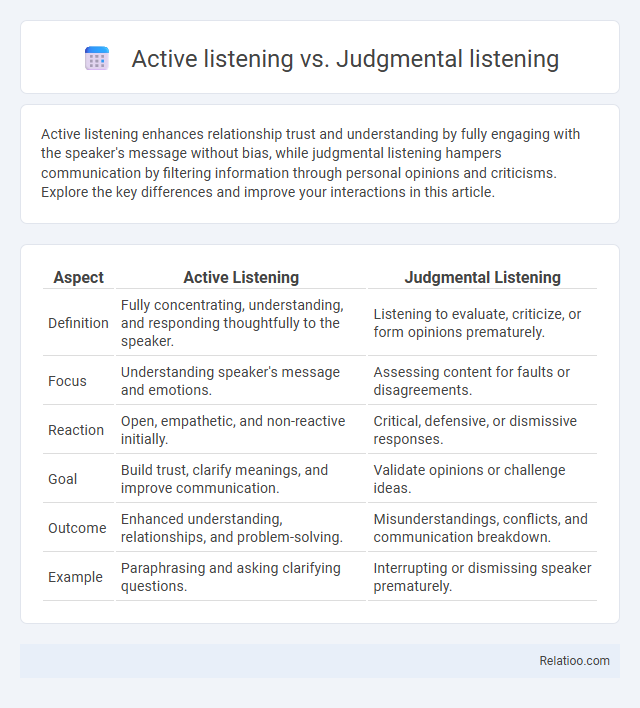Active listening enhances relationship trust and understanding by fully engaging with the speaker's message without bias, while judgmental listening hampers communication by filtering information through personal opinions and criticisms. Explore the key differences and improve your interactions in this article.
Table of Comparison
| Aspect | Active Listening | Judgmental Listening |
|---|---|---|
| Definition | Fully concentrating, understanding, and responding thoughtfully to the speaker. | Listening to evaluate, criticize, or form opinions prematurely. |
| Focus | Understanding speaker's message and emotions. | Assessing content for faults or disagreements. |
| Reaction | Open, empathetic, and non-reactive initially. | Critical, defensive, or dismissive responses. |
| Goal | Build trust, clarify meanings, and improve communication. | Validate opinions or challenge ideas. |
| Outcome | Enhanced understanding, relationships, and problem-solving. | Misunderstandings, conflicts, and communication breakdown. |
| Example | Paraphrasing and asking clarifying questions. | Interrupting or dismissing speaker prematurely. |
Introduction to Active and Judgmental Listening
Active listening involves fully concentrating, understanding, and responding thoughtfully to the speaker, enhancing communication effectiveness and building trust. Judgmental listening, by contrast, focuses on evaluating and critiquing the speaker's message, often leading to misunderstandings and defensive reactions. The distinction between active and judgmental listening is crucial for fostering meaningful dialogue and reducing conflicts in personal and professional interactions.
Defining Active Listening
Active listening involves fully concentrating, understanding, responding, and remembering what is being said without interrupting or forming judgments. Judgmental listening occurs when you evaluate or criticize the speaker's message prematurely, which hinders effective communication. Your ability to practice active listening enhances empathy and builds trust, contrasting sharply with the closed mindset of a judgmental attitude.
Understanding Judgmental Listening
Judgmental listening occurs when the listener evaluates or critiques the speaker's message rather than fully absorbing it, often leading to misunderstandings and communication breakdowns. Unlike active listening, which emphasizes empathy and open-mindedness to understand the speaker's intent, judgmental listening filters information through preconceived notions and biases. This judgmental attitude can foster negative interactions and impede effective communication by prioritizing evaluation over comprehension.
Key Differences Between Active and Judgmental Listening
Active listening involves fully concentrating, understanding, and responding thoughtfully to the speaker, promoting effective communication and empathy. Judgmental listening, by contrast, focuses on evaluating and critiquing the speaker's message prematurely, often leading to misunderstandings and defensive interactions. The key difference lies in the intent: active listening seeks to comprehend and connect, while judgmental listening prioritizes forming opinions and judgments.
Psychological Impact of Listening Styles
Active listening fosters psychological safety and emotional validation, reducing stress and enhancing interpersonal trust. Judgmental listening often triggers defensiveness and anxiety, undermining communication and increasing emotional distress. A judgmental attitude entrenches negative bias, impairing empathy and contributing to heightened psychological tension and relational conflict.
Benefits of Practicing Active Listening
Practicing active listening enhances communication by fostering empathy, reducing misunderstandings, and building trust in personal and professional relationships. Unlike judgmental listening, which evaluates and critiques prematurely, active listening fully engages with the speaker's message, promoting clarity and emotional connection. Cultivating an open attitude through active listening supports collaborative problem-solving and strengthens interpersonal bonds.
Negative Effects of Judgmental Listening
Judgmental listening leads to misunderstandings and erodes trust by causing the listener to focus on evaluating rather than understanding the speaker's message. This negative effect can create barriers to effective communication, making Your conversations less open and collaborative. Active listening, in contrast, encourages empathy and clarity, while a judgmental attitude perpetuates bias and defensiveness that hinder genuine connection.
Strategies to Enhance Active Listening Skills
Active listening involves fully concentrating, understanding, and responding thoughtfully to the speaker, which improves communication effectiveness and builds trust. Strategies to enhance active listening skills include maintaining eye contact, avoiding interruptions, summarizing key points, and asking clarifying questions to ensure accurate comprehension. Unlike judgmental listening or a judgmental attitude, which hinder open communication by fostering bias and premature evaluation, active listening requires setting aside personal judgments and focusing on the speaker's message objectively.
Overcoming Judgmental Listening Tendencies
Active listening involves fully concentrating, understanding, and responding thoughtfully, while judgmental listening focuses on evaluating or criticizing the speaker's message. Judgmental attitude further entrenches bias, hindering effective communication and empathy. Overcoming judgmental listening tendencies requires conscious effort to suspend preconceived notions, practice empathy, and engage with open-minded curiosity to foster meaningful dialogue and reduce misunderstandings.
Choosing the Right Listening Approach for Effective Communication
Active listening enhances communication by fully concentrating on the speaker, understanding their message, and responding thoughtfully, which fosters trust and clarity. Judgmental listening, where you evaluate or criticize the speaker's words prematurely, hinders effective dialogue and can damage relationships. Choosing the right listening approach involves recognizing when to engage with empathy through active listening versus setting aside judgmental attitudes to ensure Your conversations remain constructive and open.

Infographic: Active listening vs Judgmental listening
 relatioo.com
relatioo.com